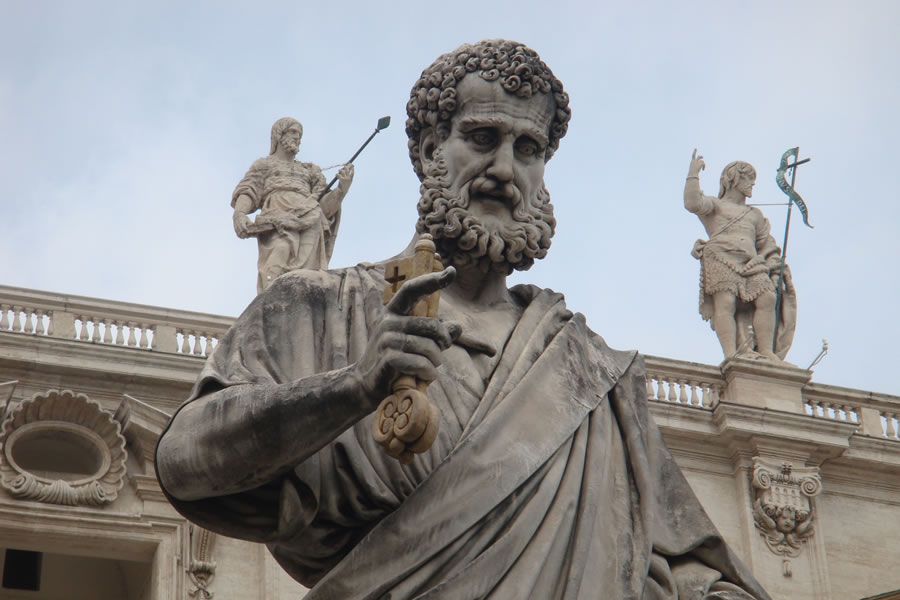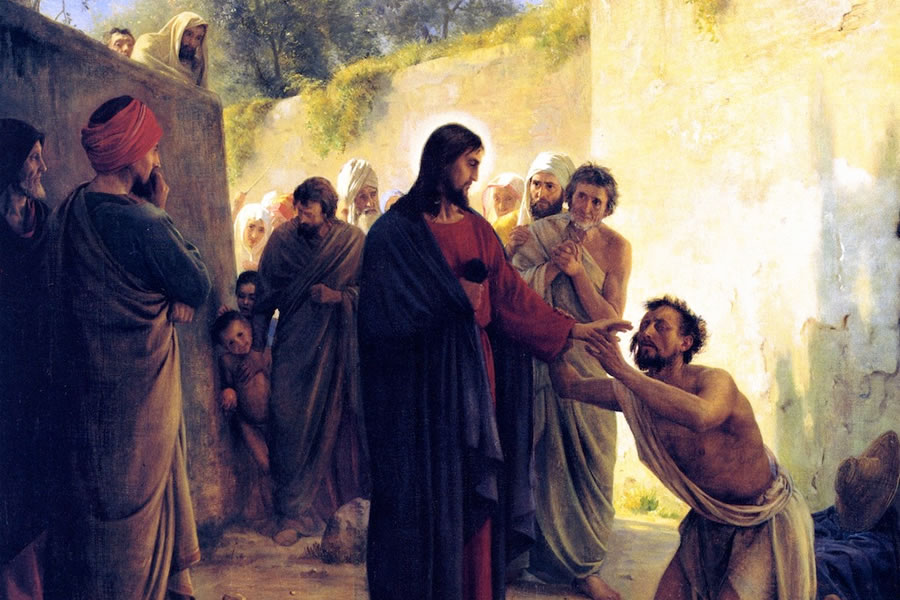St. Francis of Assisi Weekly Reflections

But Who Do You Say That I Am?
08-27-2023Weekly ReflectionWe Celebrate Worship Resource, Vol. 48, No. 3In today’s Gospel, after Jesus asks his disciples how others identify him, he asks them a more personal question: “But who do you say that I am? Peter immediately replies, “You are the Christ, the Son of the living God” (Matthew 16:15-16). Or, more accurately, it is Simon who replies, inspiring Jesus to rechristen him Peter, the rock (petrain Greek) upon which he will build his church. Quite a while later, after Jesus is raised from the dead and appears to his disciples, Jesus asks Peter another question: “Do you love me?” (John 21:15-17). Peter’s answers lead Jesus to give him a commission. Despite Peter’s earlier doubts and denials, Jesus chooses him to tend his flock, to guide his flock, and to feed his flock. Though we are not Simon Peter, we too have been given a commission: “Go, therefore, and make disciples of all nations” (Matthew 28:19). So Jesus asks us that same questions today he asked Peter. Beyond what others say, who do we say that Jesus is? Do we see him in our neighbor? Do we love him?
Who do you say that Jesus is? Do you love him?
Y Ustedes, ¿Quién Dicen Que Soy Yo?
En el Evangelio de hoy, después de que Jesús le pregunta a sus discípulos cómo me identifican los demás, le hace una pregunta más personal: “Y ustedes, ¿quién dicen que soy yo? Pedro responde inmediatamente: “Tú eres el Mesías, el Hijo del Dios vivo” (Mateo 16:15-16). O, más exactamente, es Simón quien responde, instando a Jesús a rebautizarlo como Pedro, la roca (petraen griego) sobre la que edificará su iglesia. Bastante tiempo después, después de que Jesús resucita de entre los muertos y se aparece a sus discípulos, Jesús le hace otra pregunta a Pedro: “¿Me amas?” (Juan 21:15-17). Las respuestas de Pedro llevan a Jesús a darle una comisión. A pesar de las dudas y negaciones anteriores de Pedro, Jesús lo elige para cuidar de su rebaño, guiarlo y alimentarlo. Aunque no somos Simón Pedro, a nosotros también se nos ha dado una comisión: “Id, pues, y haced discípulos a todas las naciones” (Mateo 28:19). Así que Jesús nos hace las mismas preguntas hoy que le hizo a Pedro. Más allá de lo que digan los demás, ¿quién decimos nosotros que es Jesús? ¿Lo vemos en nuestro prójimo? ¿Lo amamos?
¿Quién dices tuque es Jesús? ¿Lo amas?

God Has Mercy Upon Us All
08-20-2023Weekly ReflectionWe Celebrate Worship Resource, Vol. 48, No. 3As the Romans expanded the boundaries of their empire far beyond the city of Rome, they enjoyed levying taxes in their new territories, but they needed to hire locals to collect them. In those days, tax collection was a lucrative business, for many tax collectors demanded more than what was actually owed and pocketed the difference. Because their neighbors viewed them as collaborators, they were not welcome in the temple or in respectable circles. But Jesus welcomed them, going so far as choosing the tax collector Matthew as a disciple. So hearing today’s Gospel passage from Matthew’s perspective adds a layer to the story. No doubt Matthew, like the Canaanite woman, had been called a dog or some similar slur. But Jesus saw him as a lost sheep, someone outside the flock. Matthew, the outcast tax collector, is a natural target of Jesus’ mission. The Canaanite woman is as well, and a special one, for by her great faith and persistence she risked rejection, too. We are all rejected by someone at some time. Perhaps it is for who we are, or for what we do, or for our race, ethnicity, gender, sexuality, or political leanings. But Jesus finds us all, accepts us all, heals us all. As Paul, an outcast himself, wrote to the residents of Rome itself, God has mercy upon us all.
Who do you treat as an outcast in some way? Like Jesus, will you take a second look, listen a second time?
Dios Tiene Piedad De Todos Nosostros
Amedida que los romanos ampliaron los límites de su imperio mucho más allá de la ciudad de Roma, disfrutaron de impuestos sobre sus nuevos territorios, pero necesitaban contratar locales para recogerlos. En aquellos días, la recaudación de impuestos era un negocio lucrativo, ya que muchos recaudadores de impuestos exigían más de lo que realmente se debía y se embolsaba la diferencia. Debido a que sus vecinos los veían como colaboradores, no eran bienvenidos en el templo o en los círculos respetables. Pero Jesús los recibió, llegando a elegir al recaudador de impuestos Mateo como discípulo. Entonces, escuchar el pasaje del evangelio de hoy desde la perspectiva de Mateo agrega una capa a la historia. Sin duda, Mateo, como la mujer cananea, había sido llamado perro o un insulto similar. Pero Jesús lo vio como una oveja perdida, alguien fuera del rebaño. Mateo, el recaudador de impuestos marginado, es un objetivo natural de la misión de Jesús. La mujer cananea también es, y especial, porque por su gran fe y persistencia también arriesgó el rechazo. Todos somos rechazados por alguien en algún momento. Quizás sea para quienes somos, o por lo que hacemos, o para nuestra raza, etnia, género, sexualidad o inclinaciones políticas. Pero Jesús nos encuentra a todos, nos acepta a todos, nos cura a todos. Como Pablo, un marginado, escribió a los residentes de Roma, Dios tiene piedad de todos nosotros.
¿A quién tratas como marginado de alguna manera? Como Jesús, ¿echarás un segundo vistazo, escuchas por segunda vez?

Put your Trust in Jesus
08-13-2023Weekly ReflectionWe Celebrate Worship Resource, Vol. 48, No. 3When we are in fear or under extreme stress, it’s natural to panic, to react without thinking and make rash decisions. Witness Saint Peter today. Seeing what they think is a ghost during a terrible storm, the disciples begin to scream. After Jesus identifies himself and reassures them, Peter climbs overboard, daring to walk on the water like Jesus. When the wind comes up, doubt creeps in. Peter’s trust in the Lord blows away. He panics. To recall a parable we heard a few weeks ago, his faith had been planted on rocky ground, springing to life at once but then withering for lack of roots. Peter’s faith was not yet well-anchored, so on rocky ground, or on rocky waters, he loses it. But the extravagance of the sower is eventually rewarded. Just as Elijah found God in the gentle calm after the storm, Peter finds the Lord in the gentle calm above the raging sea. May we find refuge in the Lord amid the storms in our own lives.
What storm are you experiencing in your life right now? Can you put your trust in the Lord to lead you through the wind and waves?
Pon tu Confianze en Jesús
Cuando tenemos miedo o estamos bajo un estrés extremo, es natural entrar en pánico, reaccionar sin pensar y tomar decisiones precipitadas. Sea testigo de San Pedro hoy. Al ver lo que creen que es un fantasma durante una terrible tormenta, los discípulos comienzan a gritar. Después de que Jesús se identifica y los tranquiliza, Pedro se sube por la borda, atreviéndose a caminar sobre el agua como Jesús. Cuando sopla el viento, la duda se cuela. La confianza de Pedro en el Señor desaparece. Él entra en pánico. Para recordar una parábola que escuchamos hace unas semanas, su fe había sido plantada en terreno pedregoso, saltando a la vida de inmediato pero luego marchitándose por falta de raíces. La fe de Pedro aún no estaba bien anclada, así que en terreno pedregoso, o en aguas pedregosas, la pierde. Pero la extravagancia del sembrador finalmente es recompensada. Así como Elías encontró a Dios en la calma apacible después de la tormenta, Pedro encuentra al Señor en la calma apacible sobre el mar embravecido. Que podamos encontrar refugio en el Señor en medio de las tormentas en nuestras propias vidas.
¿Qué tormenta estás experimentando en tu vida en este momento? ¿Puedes poner tu confianza en el Señor para que te guíe a través del viento y las olas?

Transfiguration
08-06-2023Weekly ReflectionWe Celebrate Worship Resource, Vol. 48, No. 3Peter, James, and John were given a wonderful gift: the opportunity to see Jesus transfigured before their eyes and to hear the voice of God from the heavens. They are not the first to have been afforded a revelatory but fleeting glimpse of God’s glory. In the first reading, Daniel gives an account of a vision he had—over the course of a single night—of “the Ancient One” all in white and the Son of man receiving dominion over the earth. He seemingly never had this vision again. When Christ was born, the magi saw a bright star over Bethlehem from miles and miles away, but presumably the star eventually faded and became just another star in the sky. The earth trembled when Jesus died on the cross, leading unbelieving witnesses to believe, but soon the earthquake ended. The transfiguration is another glimpse, however brief, of God’s glory made manifest to a certain few. We are today’s witnesses of God’s glory. With eyes and ears of faith, we ourselves may have moments of sudden realization of God’s presence in the world. May these moments sustain us as we make our way through life, hopeful of eternal glory.
How can you use eyes and ears of faith to see and hear beyond what the world recognizes?
Transfiguración
Pedro, Santiago y Juan recibieron un regalo maravilloso: la oportunidad de ver a Jesús transfigurado ante sus ojos y escuchar la voz de Dios desde los cielos. No son los primeros a los que se les ha concedido un vislumbre revelador pero fugaz de la gloria de Dios. En la primera lectura, Daniel da cuenta de una visión que tuvo, en el transcurso de una sola noche, del “Anciano” todo de blanco y el Hijo del hombre recibiendo el dominio sobre la tierra. Aparentemente nunca volvió a tener esta visión. Cuando nació Cristo, los magos vieron una estrella brillante sobre Belén desde millas y millas de distancia, pero presumiblemente la estrella finalmente se desvaneció y se convirtió en una estrella más en el cielo. La tierra tembló cuando Jesús murió en la cruz, haciendo creer a los testigos incrédulos, pero pronto el terremoto cesó. La transfiguración es otro vistazo, por breve que sea, de la gloria de Dios manifestada a unos pocos. Somos los testigos de hoy de la gloria de Dios. Con los ojos y oídos de la fe, nosotros mismos podemos tener momentos de súbita realización de la presencia de Dios en el mundo. Que estos momentos nos sostenga en nuestro camino por la vida, con la esperanza de la gloria eterna.
¿Cómo puedes usar los ojos y los oídos de la fe para ver y escuchar más allá de lo que el mundo reconoce?

Nurturing The Kingdom of Heaven
07-30-2023Weekly ReflectionWe Celebrate Worship Resource, Vol. 48, No. 3In the days when few people could read or write, parables provided powerful images and meaningful lessons that listeners could understand, appreciate, and remember. For the third Sunday in a row, we hear Jesus tell parables about the kingdom of heaven. His earlier parables focused on how it grows. Today we hear Jesus tell his disciples how wonderful the kingdom is. Like a treasure buried in a field or a pearl of great price, attaining it is worth selling everything we have. Importantly, neither buyer in today’s parable sells everything reluctantly. In fact, the one who finds the treasure in a field sells everything “out of joy” (Matthew 13:44). It is obvious that the merchant who finds the pearl feels the same way. We are given the same offer. And we don’t have to dig up fields or search for fine pearls! Because of Christ’s love for us and his sacrifice for our sins, the seed of the kingdom of heaven has already been planted within us. It is for us to nurture it, treasure it, and use it to produce great fruit.
How best can the kingdom of heaven blossom in you?
Nutriendo El Reino Del Cielo
En los días en que pocas personas sabían leer o escribir, las parábolas brindaban imágenes poderosas y lecciones significativas que los oyentes podían entender, apreciar y recordar. Por tercer domingo consecutivo, escuchamos a Jesús contar parábolas sobre el reino de los cielos. Sus parábolas anteriores se centraron en cómo crece. Hoy escuchamos a Jesús decir a sus discípulos lo maravilloso que es el reino. Como un tesoro enterrado en un campo o una perla de gran valor, por alcanzarla vale la pena vender todo lo que tenemos. Es importante destacar que ninguno de los compradores de la parábola de hoy vende todo de mala gana. De hecho, quien encuentra el tesoro en un campo, vende todo “por alegría” (Mateo 13:44). Es obvio que el comerciante que encuentra la perla siente lo mismo. Nos dan la misma oferta. ¡Y no tenemos que cavar campos o buscar perlas finas! Por el amor de Cristo por nosotros y su sacrificio por nuestros pecados, la semilla del reino de los cielos ya ha sido plantada dentro de nosotros. Depende de nosotros nutrirlo, atesorarlo y usarlo para producir un gran fruto.
¿Cómo puede florecer mejor en ti el reino de los cielos?

Wheat Or Weed?
07-23-2023Weekly ReflectionWe Celebrate Worship Resource, Vol. 48, No. 3In the parable of the wheat and the weeds, the weed Jesus refers to is darnel, a poisonous plant often called “false wheat,” because it resembles wheat right up until the ears of grain appear. It is difficult for anyone to distinguish between the two before they mature. In the parable, the farmer decides to leave the darnel, allowing it to receive the same nutrients from the sun, the rain, and the soil until harvest. Then the wheat will be gathered into the barn and the weeds will be burned. Unlike “true wheat” and “false wheat,” which mature around the same time each season, people don’t always mature at the same rate. Our true nature may continue to develop long into adulthood, growing or changing as time goes on. With God’s grace, what appears in us to be false wheat may ripen into true wheat. Therefore, our patient God governs us “with much lenience,” permitting repentance at any time (Wisdom 12:18). In turn, we are called to be as kind as we are just, forgiving those who would poison us or tempt us (perhaps even ourselves), just as we ask others to forgive us, hoping we may all bloom in the end.
What weeds are poisoning your heart?
¿Trigo O Cizaña?
En la parábola del trigo y la cizaña, la cizaña a la que se refiere Jesús es la cizaña, una planta venenosa a menudo llamada “falso trigo”, porque se parece al trigo hasta que aparecen las espigas. Es difícil para cualquiera distinguir entre los dos antes de que maduren. En la parábola, el agricultor decide dejar la cizaña, dejándola recibir los mismos nutrientes del sol, la lluvia y la tierra hasta la cosecha. Entonces se recogerá el trigo en el granero y se quemará la cizaña. A diferencia del "trigo verdadero" y el "trigo falso", que maduran aproximadamente al mismo tiempo cada temporada, las personas no siempre maduran al mismo ritmo. Nuestra verdadera naturaleza puede continuar desarrollándose hasta la edad adulta, creciendo o cambiando a medida que pasa el tiempo. Con la gracia de Dios, lo que en nosotros parece ser trigo falso puede madurar y convertirse en trigo verdadero. Por eso, nuestro Dios paciente nos gobierna “con mucha clemencia”, permitiendo el arrepentimiento en cualquier momento (Sabiduría 12,18). A su vez, estamos llamados a ser tan amables como justos, perdonando a quienes nos envenenarían o nos tentarían (quizás incluso a nosotros mismos), así como pedimos a los demás que nos perdonen, con la esperanza de que al final todos florezcamos.
¿Qué malas hierbas están envenenando tu corazón?

Nurturing God's Word
07-16-2023Weekly ReflectionWe Celebrate Worship Resource, Vol. 48, No. 3The sower in today’s Gospel has a very wasteful method of scattering seed, with three-quarters of the seed landing where it will fail at one stage or another. Yet Jesus explains to his disciples that this is the way the word of God is sown here on earth. Why would the sower toss seed among thorns or rocks or traffic? Perhaps because there is always hope, even where it seems futile. After all, God sent the Spirit to remain with us always and the Spirit blows where it will. It may also help to think of the different locations not as different people, but as each and everyone of us at different times and in different contexts. Sometimes when God’s word comes to us, it goes in one ear and out the other. Sometimes we don’t understand it or can’t relate it to our lives. Sometimes we lack the courage to take it to heart and change our thinking or our behavior. It can be a challenge to be fertile ground for God’s word. Bringing forth good fruit, to borrow Paul's words from the second reading , can be compared to a pregnant woman groaning in labor. But let us accept the challenge, not allowing God’s word to go to waste, but accepting it and nurturing it and letting it bear fruit through us so it may achieve the end for which it was sown.
What word is God calling you to take to heart, nurture, and bring forth?
Nutriendo La Palabra De Dios
El sembrador en el Evangelio de hoy tiene un método muy derrochador de esparcir la semilla, con tres cuartas partes de la semilla cayendo donde fallará en una etapa u otra. Sin embargo, Jesús explica a sus discípulos que así se siembra la palabra de Dios aquí en la tierra. ¿Por qué arrojaría el sembrador la semilla entre espinos, rocas o tráfico? Quizás porque siempre hay esperanza, incluso donde parece inútil. Después de todo, Dios envió el Espíritu para que permanezca con nosotros siempre y el Espíritu sopla donde quiere. También puede ayudar pensar en los diferentes lugares no como personas diferentes, sino como todos y cada uno de nosotros en diferentes momentos y en diferentes contextos. A veces, cuando nos llega la Palabra de Dios, nos entra por un oído y nos sale por el otro. A veces no lo entendemos o no podemos relacionarlo con nuestras vidas. A veces nos falta el coraje para tomarlo en serio y cambiar nuestro pensamiento o nuestro comportamiento. Puede ser un desafío ser tierra fértil para la palabra de Dios. Dar buenos frutos, tomando prestadas las palabras de Pablo de la segunda lectura, puede compararse con una mujer embarazada que grita durante el parto. Pero aceptemos el desafío, no dejando que la palabra de Dios se desperdicie, sino aceptándola y alimentándola y dejándola fructificar a través de nosotros para que alcance el fin para el que fue sembrada.
¿Qué palabra te está llamando Dios a tomar en serio, nutrir y dar a luz?

Rest in God
07-09-2023Weekly ReflectionWe Celebrate Worship Resource, Vol. 48, No. 3As the prophets had both challenged and comforted the people generations before, Jesus both challenges and comforts his audience. Last week we heard his challenge, telling his disciples that they must carry their crosses and follow him. But today we hear him comfort the crowds, assuring them that his burden is light and they will find rest in him. We experience the truth of this in our own lives. We all have crosses to carry. It may be the illness of a close relative and our ongoing care for that person. It may be job loss, failure in school, or the need to work two jobs to pay the bills. It may be addiction or mental illness that we feel powerless to overcome. But at the same time, we know that God accompanies us in all our trials. We know that Jesus loves us so much that he sacrificed his life for us. We know that he is willing and able to carry our crosses for us now because he literally carried our cross then. Today, Jesus invites us to lighten our burdens by turning to him. What we hear Saint Paul tell the Romans today applies to us as well: We live in the spirit, for the Spirit of God dwells in us. The Spirit of God frees us from the idea that our crosses will be the death of us. Our crosses find their meaning—and ultimately, their redemption—in Christ.
What cross is most difficult for you to carry? How does Jesus lighten your burden?
Descansa En Dios
Así como los profetas habían desafiado y consolado a la gente generaciones antes, Jesús desafía y consuela a su audiencia. La semana pasada escuchamos su desafío, diciéndoles a sus discípulos que deben llevar sus cruces y seguirlo. Pero hoy lo escuchamos consolar a las multitudes, asegurándoles que su carga es ligera y que encontrarán descanso en él. Experimentamos la verdad de esto en nuestras propias vidas. Todos tenemos cruces que llevar. Puede ser la enfermedad de un pariente cercano y nuestro cuidado continuo por esa persona. Puede ser la pérdida del trabajo, el fracaso escolar o la necesidad de tener dos trabajos para pagar las cuentas. Puede ser una adicción o una enfermedad mental que nos sentimos impotentes para superar. Pero al mismo sabemos que Dios nos acompaña en todas nuestras pruebas. Sabemos que Jesús nos ama tanto que sacrificó su vida por nosotros. Sabemos que Él está dispuesto y es capaz de llevar nuestras cruces por nosotros ahora porque literalmente cargó nuestra cruz entonces. Hoy, Jesús nos invita a aligerar nuestras cargas volviéndonos a él. Lo que oímos decir a San Pablo a los Romanos hoy también se aplica a nosotros: Vivimos en el espíritu, porque el Espíritu de Dios mora en nosotros. El Espíritu de Dios nos libera de la idea de que nuestras cruces serán nuestra muerte. Nuestras cruces encuentran su significado y, en última instancia, su redención, en Cristo.
¿Qué cruz te resulta más difícil de llevar? ¿Cómo aligera Jesús tu carga?

Newness of Life
07-02-2023Weekly ReflectionWe Celebrate Worship Resource, Vol. 48, No. 2Jesus asks a lot of his disciples, but he offers an incredible reward. A reward beyond all expectations has always been given to those who accept the challenge of welcoming God, or God’s emissary, into their lives. In the first reading, a woman takes the initiative to welcome the prophet Elisha into her home, going so far as to arrange a room for him. She is rewarded with an extraordinary promise. (A year after this scene, that promise is fulfilled.) Paul impresses upon the Romans that if we are baptized in Christ, we are also baptized in his death. But this also means that “just as Christ was raised from the dead by the glory of the Father, we too might live in newness of life” (Romans 6:4). Jesus tells his disciples that they must take up their crosses, but those who do so for his sake will be rewarded. As baptized Christians, we are now those disciples that Jesus speaks to. We are called to take up our crosses, to welcome those who come in God’s name—even if with merely a cup of water—and to sacrifice our own concerns for Christ’s mission. This is how we may lie in “newness of life.”
What sacrifice is God asking you to make in order to carry out the Christian mission? Are you willing to make it?
Vida Nueva
Jesús pide mucho de sus discípulos, pero ofrece una recompensa increíble. Siempre se ha dado una recompensa más allá de todas las expectativas a aquellos que aceptan el desafío de dar la bienvenida a Dios, o al emisario de Dios, en sus vidas. En la primera lectura, una mujer toma la iniciativa de acoger al profeta Eliseo en su casa, llegando incluso a prepararle una habitación. Ella es recompensada con una promesa extraordinaria. (Un año después de esta escena, esa promesa se cumple.) Pablo inculca a los romanos que si somos bautizados en Cristo, también somos bautizados en su muerte. Pero esto también significa que “así como Cristo resucitó por el poder del Padre, también nosotros andemos en una vida nueva.” (Romanos 6:4). Jesús le dice a sus discípulos que deben tomar sus cruces, pero los que lo hagan por él serán recompensados. Como cristianos bautizados, ahora somos esos discípulos a los que Jesús les habla. Estamos llamados a tomar nuestras cruces, a acoger a los que vienen en nombre de Dios, aunque solo sea con un vaso de agua, y a sacrificar nuestras propias preocupaciones por la misión de Cristo. Así es como podemos vivir una “vida nueva”.
¿Qué sacrificio te pide Dios que hagas para llevar a cabo la misión cristiana? ¿Estás dispuesto a hacerlo?

The Lord Is With Me
06-25-2023Weekly ReflectionWe Celebrate Worship Resource, Vol. 48, No. 2Fear is hard to overcome. We have spent the last few years fearing sickness and death from a virus. Politicians can prey upon our fears to get our vote. Irrational fear of those not like us can lead to prejudice and hate. The disciples, newly commissioned to preach the gospel, feared persecution. Prophets like Jeremiah did too, and not without reason. Yet, as Jeremiah says, “the Lord is with me” (20:11). Similarly, Jesus assures his disciples that if God watches over even a tiny sparrow, they can be confident that God watches over them. Note that Jesus does not tell his disciples that no harm will befall them. The sparrow still falls to the ground. We will still have health crises, lose loved ones, suffer tragedies. But we do not face any of those terrible things alone. God is with us. Through “the gracious gift of the one person Jesus Christ,” God’s grace overflows for us all (Romans 5:15). God cares for us so deeply, so completely, so hard that God sent the Son to redeem us and the Spirit to be with us always. May that assurance overcome our fears.
Name one of your fears. How can God’s love for you and care for you allow you to overcome that fear?
El Señor Esta Conmigo
El miedo es difícil de superar. Hemos pasado los últimos años temiendo la enfermedad y la muerte por un virus. Los políticos pueden aprovecharse de nuestros miedos para obtener nuestro voto. El miedo irracional a los que no son como nosotros puede conducir al prejuicio y al odio. Los discípulos, recién comisionados para predicar el evangelio, temían la persecución. Profetas como Jeremías también lo hicieron, y no sin razón. Sin embargo, como dice Jeremías, “el Señor está conmigo” (20:11). De manera similar, Jesús les asegura a sus discípulos que si Dios cuida aunque sea un gorrión diminuto, pueden estar seguros de que Dios los cuida a ellos. Tenga en cuenta que Jesús no les dice a sus discípulos que no les ocurrirá ningún mal. El gorrión todavía cae al suelo. Todavía tendremos crisis de salud, perderemos seres queridos, sufriremos tragedias. Pero no nos enfrentamos solos a ninguna de esas cosas terribles. Dios esta con nosotros. A través de “el don de un solo hombre, Jesucristo”, la gracia de Dios se desborda para todos nosotros (Romanos 5:15). Dios se preocupa por nosotros tan profundamente, tan completamente, tan intensamente que Dios envió al Hijo para redimirnos y al Espíritu para estar siempre con nosotros. Que esa seguridad supere nuestros miedos. ¿Nombra uno de tus miedos.
¿Cómo puede el amor y el cuidado de Dios por ti permitirte superar ese miedo?

The Kingdom of Heaven is at Hand
06-18-2023Weekly ReflectionWe Celebrate Worship Resource, Vol. 48, No. 2For weeks, the disciples have been traveling through Galilee with Jesus as he teaches the crowds, heals the sick, drives out demons, welcomes sinners, and proclaims the kingdom of heaven. Jesus is moved by the crowds, who are “like sheep without a shepherd” (Matthew 9:36). Jesus could continue to meet all their needs himself, but he knows two things. First, he will not be with them forever. Second, he knows that his disciples could do all this as well. So he commissions them to go to the twelve tribes of Israel (twelve apostles, twelve tribes) and “cure the sick, raise the dead, cleanse lepers, drive out demons” (10:8), We are those disciples now. Jesus calls us to seek out those who are lost and to drive out whatever ails them. The last line of the Gospel can reassure us in their mission: “Without cost have you received; without cost you are to give.” (10:8) God’s grace is given to us freely, despite our sinfulness, despite our failing, despite our unworthiness. Jesus calls us to pass it on to others freely as well, despite their sinfulness, despite their failings, despite their unworthiness.
What have you been given that you will pass on to someone else?
Ya Se Acerca El Reino De Los Cielos
Durante semanas, los discípulos han estado viajando por Galilea con Jesús mientras enseña a las multitudes, sana a los enfermos, expulsa demonios, da la bienvenida a los pecadores y proclama el reino de los cielos. Jesús se conmueve por las multitudes, que son “como ovejas sin pastor” (Mateo 9:36). Jesús podría seguir satisfaciendo todas sus necesidades por sí mismo, pero sabe dos cosas. Primero, no estará con ellos para siempre. Segundo, él sabe que sus discípulos también podrían hacer todo esto. Así que les encarga ir a las doce tribus de Israel (doce apóstoles, doce tribus) y “curar enfermos, resucitar muertos, limpiar leprosos, expulsar demonios” (10:8), Nosotros somos esos discípulos ahora. Jesús nos llama a buscar a los que están perdidos y a expulsar todo lo que los aqueja. La última línea del Evangelio nos puede reafirmar en su misión: “Gratuitamente han recibido este poder; ejérzanlo, pues gratuitamente. “(10:8). La gracia de Dios nos es dada gratuitamente, a pesar de nuestra pecaminosidad, a pesar de nuestro fracaso, a pesar de nuestra indignidad. Jesús nos llama a transmitirlo a los demás también libremente, a pesar de su pecaminosidad, a pesar de sus fallas, a pesar de su indignidad.
¿Qué te han dado que le vas a pasar a otra persona?

Do This is in Remembrance of Me
06-11-2023Weekly ReflectionWe Celebrate Worship Resource, Vol. 48, No. 2Many Catholics misunderstand the real presence of Christ in the Eucharist, thinking it merely symbolic. (Truly, it can be hard to believe that the thin, flat host is really bread, let alone Christ.) Today’s Gospel helps us understand. Jesus tells the crowds that he is the living bread come down from heaven and that those who eat his flesh and drink his blood will have eternal life. Understandably, they recoil, but Jesus insists “my flesh is true food, and my blood is true drink” (John 6:55). Recall that John used that very word—flesh — at the very beginning of his Gospel: “In the beginning was the Word. . . And the Word was God . . .and the Word became flesh” (John 1:1,14). When the Word Made Flesh invites everyone to eat his flesh, he offers us the chance to have the divine within us. Later, at the Last Supper, the divine Word—the Word that was able to bring the whole world into being—transforms bread and wine into his Body and Blood. Since he commanded us to continue to do this in memory of him, still today our own bread and wine truly become the Body and Blood of Christ in the Eucharist.
How does realizing that Christ is truly present in the Eucharist change the importance of receiving the Eucharist for you?
Hagan EstoEn Memoria Mía
Muchos católicos malinterpretan la presencia real de Cristo en la Eucaristía, pensando que es meramente simbólica. (Ciertamente, puede ser difícil creer que la hostia delgada y plana es realmente pan, y mucho menos Cristo). El Evangelio de hoy nos ayuda a entender. Jesús le dice a la multitud que él es el pan vivo bajado del cielo y que los que comen su carne y beben su sangre tendrán vida eterna. Es comprensible que retrocedan, pero Jesús insiste en que “mi carne es verdadera comida, y mi sangre es verdadera bebida” (Juan 6:55). Recuerde que Juan usó esa misma palabra —carne— al comienzo mismo de su Evangelio: “En el principio era el Verbo. . . Y la Palabra era Dios. . .y el Verbo se hizo carne” (Juan 1:1,14). Cuando el Verbo hecho Carne invita a todos a comer su carne, nos ofrece la posibilidad de tener lo divino dentro de nosotros. Más tarde, en la Última Cena, el Verbo divino, el Verbo que supo dar vida al mundo entero, transforma el pan y el vino en su Cuerpo y Sangre. Puesto que nos mandó a continuar haciéndolo en memoria suya, todavía hoy nuestro propio pan y vino se convierten verdaderamente en el Cuerpo y la Sangre de Cristo en la Eucaristía.
¿De qué manera el darse cuenta de que Cristo está realmente presente en la Eucaristía cambia la importancia de recibir la Eucaristía para ti?

The Father, The Son And The Holy Spirit
06-04-2023Weekly ReflectionWe Celebrate Worship Resource, Vol. 48, No. 2On the summit of Mount Sinai God revealed to Moses the divine name and the divine essence: “the Lord, the Lord, a merciful and gracious God, slow to anger and rich in kindness and fidelity” (Exodus 34:6). Note that every one of the words that God chose to define the divine essence is relational. God could have used terms like “all-knowing” or “all-powerful” to describe the divine essence and that would have been accurate, but those attributes would be true even if there was no one else in the entire universe. Mercy and patience, kindness and faithfulness, on the other hand, have meaning only in relation to someone else. With these attributes, God continuously calls all creation to communion with the Trinity, who are themselves in communion. Sin separates us from God, but our merciful and gracious Father sent the Son to save us from our sins and restore that communion. Finally, the Father and Son gave us the Spirit to dwell with us forever. May the communion so wonderfully modeled by the Father, the Son, and the Holy Spirit inspire us to seek that communion with God and with all God’s creation.
How do you show mercy and kindness to others, seeking communion with God’s creation and in turn with God?
El Padre, El Hijo Y El Espíritu Santo
En la cima del monte Sinaí, Dios reveló a Moisés el nombre divino y la esencia divina: “el Señor, el Señor, Dios compasivo y clemente, lento para la ira y abundante en misericordia y fidelidad” (Éxodo 34:6). Nótese que cada una de las palabras que Dios escogió para definir la esencia divina es relacional. Dios podría haber usado términos como "omnisciente" o "todopoderoso" para describir la esencia divina y eso habría sido exacto, pero esos atributos serían verdaderos incluso si hubiera alguien más en todo el universo. La misericordia y la paciencia, la bondad y la fidelidad, por otro lado, tienen significado solo en relación con otra persona. Con estos atributos, Dios llama continuamente a toda la creación a la comunión con la Trinidad, quienes están ellos mismos en comunión. El pecado nos separa de Dios, pero nuestro Padre misericordioso y lleno de gracia envió al Hijo para salvarnos de nuestros pecados y restaurar esa comunión. Finalmente, el Padre y el Hijo nos dieron el Espíritu para que more con nosotros para siempre. Que la comunión tan maravillosamente modelada por el Padre, el Hijo y el Espíritu Santo nos inspire a buscar esa comunión con Dios y con toda la creación de Dios.
¿Cómo muestras misericordia y bondad a los demás, buscando la comunión con la creación de Dios y, a su vez, con Dios?